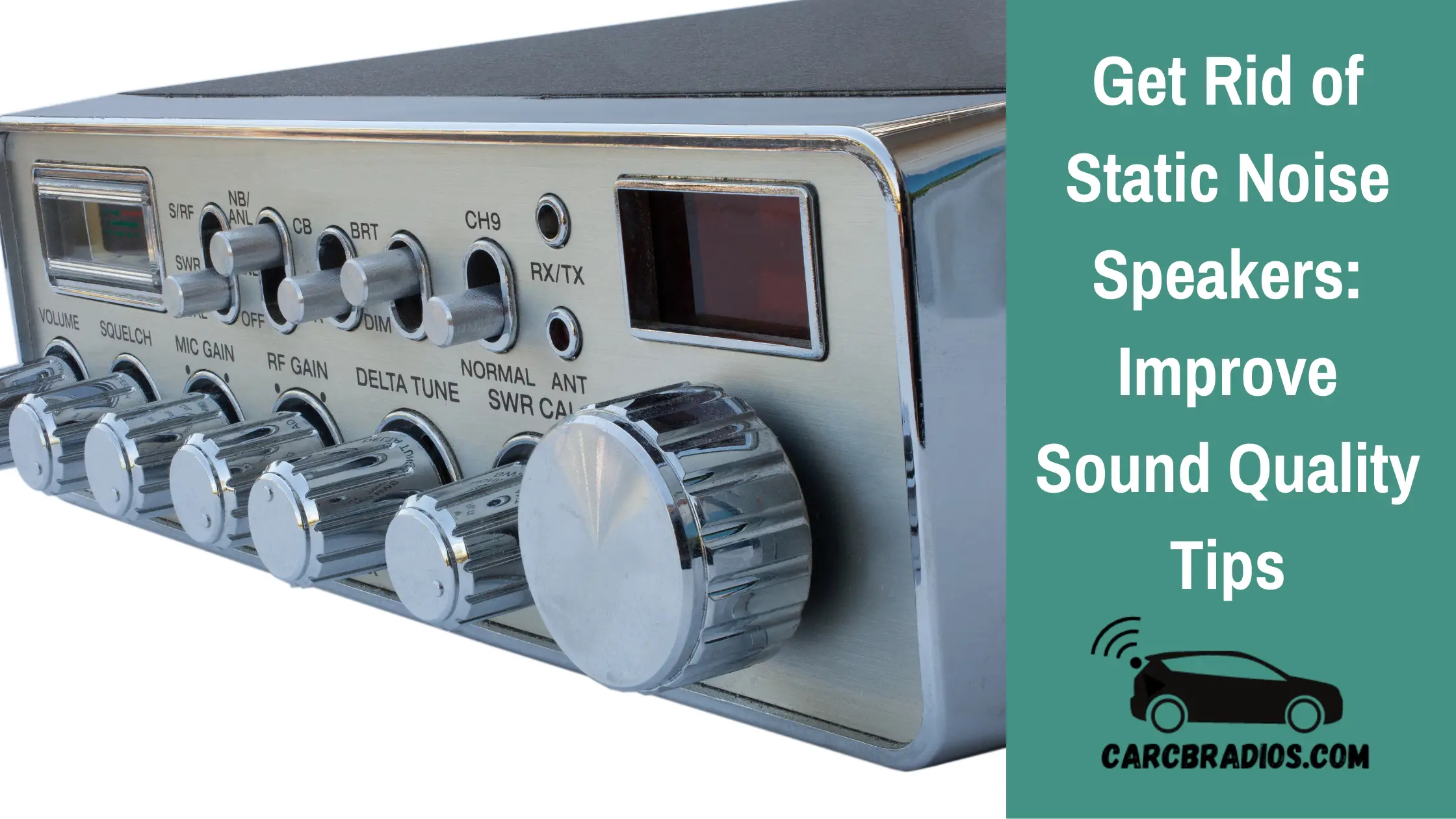By: Jeremy Neisser
As someone who enjoys listening to music or watching movies, it can be frustrating when static noise interferes with the audio quality. This is a common issue that arises due to the disturbance of copper coils in speakers from electromagnetic fields or current bounce from the computer system to the speakers’ amplifier. Fortunately, there are various techniques available to eliminate static noise, and in this article, I will discuss some of the best and top-of-the-list techniques.
All of these methods are verified and take no time to apply, making it easy for anyone to resolve this issue. So, if you're tired of hearing static noise in your speakers, keep reading to learn about the techniques that can help improve your audio experience.
How Do I Get Rid Of Static Noise In My Speakers?
If you are experiencing static noise in your speakers, there are several steps you can take to eliminate it. Here are some of the most effective ones:
Check Audio Cable Connections
One of the most common causes of static noise in speakers is loose cable connections. When cables are not connected firmly, short circuits can occur between them, leading to buzzing or crackling sounds. To fix this issue, you can try reassembling the cable connections. Here are the steps:
Disconnect the speaker from the computer.
Disassemble all the cables from the computer and the speakers to the amplifier.
Place these cables again as firmly.
If you still have that noise, try to replace the cables with new ones.
Keep Speakers Away From Electromagnetic Fields
Electromagnetic fields (EMFs) are generated by various electrical devices and can cause speaker coils to malfunction, leading to static and buzzing noises. To avoid this, keep the speakers away from any EMF-producing devices such as computers, cell phones, microwave ovens, and other electronic devices. It is also critical that the speakers be kept away from power cords and plugs. An EMF shield is recommended if you use electronic devices near your speakers. It will aid in the prevention of noise-related damage or interference.
Change the Audio Channel
The selection of the wrong audio channels will not be able to communicate properly between the computer and speakers. It might lead to static noise from the speakers. To fix this issue, change the audio channel in your computer’s sound settings. Here’s how to select the right audio channel according to your computer:
Open sound settings by right-clicking on the speaker icon in your system tray and selecting “Sound.”
Go to the “Playback” tab and click on your default speakers.
Next, click on the “Configure” button.
Select the settings that suit your speakers once in the new configuration settings. If you have 5.1 surround sound speakers, select that option and click “Next.”
Once done, click the “Test” button to confirm your settings.
Now press next and select which full-length speakers, “Front or surround sound.”
Press next again to finish the configuration settings.
Remove Other Attached Audio Device
If you connect multiple audio devices to your computer, it will cause sound interference in your speakers. This interference is known as crosstalk. It is due to the signals of other audio devices interacting with your speakers. As a result, you hear static noise from your computer. You should remove all the audio devices attached to your computer system until you detect which device the static noise is coming from. Once pinpointed, you can fix or remove that audio device from your computer. It will resolve the problem.
Clean Speaker Audio Jack
If your computer’s audio jack is rusty or has carbon, your speaker will make static and buzzing noises. First, you have to clean the audio jack properly. You can use a cotton swab and rubbing alcohol to clean the jack. Put a few drops of isopropyl alcohol on the cotton swab and begin to clean the audio jack. Make sure that all the dirt, carbon, or rust is removed from it. You can also gently use soft sandpaper to rub the audio jack to clean it. If your speaker is still making these sounds after you’ve cleaned the jack, you might want to replace the audio cable.
Check for Any Damage to Speakers
If you have speakers that are damaged, they will produce static noises. You should inspect the speakers from the inside and outside to look for any possible damage or tear in the speaker cone. You should get the speaker repaired or replaced if you find any damage. Also, check if there are any broken wires in the speaker. If there are, you should replace them with new ones. Broken or damaged wires often cause electrical shocks in the speakers. In addition, it can produce static noise and other buzzing sounds.
Ground Your Computer
Grounding is a method of preventing static charge from flowing to other devices. In grounding, you must bypass the computer’s charge to the ground. You can connect the ground to your computer system via any metallic wire. You can also do this by placing an ESD mat under your computer and attaching the computer with the help of ESD connectors. This method will ensure that no current will flow through your speakers and produce that static buzzing sound.
Conclusion
After experiencing static or buzzing noises from my computer speakers, I have found several solutions to troubleshoot and fix the problem. These include adjusting the volume, checking the connections, updating drivers, and using noise-canceling software. By following these methods, I was able to successfully resolve the issue.
Frequently Asked Questions
How to Eliminate Static Noise from Car Speakers?
There are several ways to eliminate static noise from car speakers. One way is to check the speaker connections and ensure they are properly grounded. Another way is to check the wiring and make sure there are no loose connections or damaged wires. It is also important to ensure that the car battery is in good condition and has enough power to run the speakers. Using a noise filter or a ground loop isolator can also help reduce static noise in car speakers.
How to Remove Static Noise from Amplifier?
To remove static noise from an amplifier, you can try adjusting the volume level or the gain settings. It is also important to ensure that the amplifier is properly grounded and that there are no loose connections or damaged wires. Using a noise filter or a ground loop isolator can also help reduce static noise in amplifiers.
How Do I Reduce Static Noise in My Speakers?
To reduce static noise in speakers, you can try adjusting the volume level or the gain settings. It is also important to ensure that the speakers are properly grounded and that there are no loose connections or damaged wires. Using a noise filter or a ground loop isolator can also help reduce static noise in speakers.
What Causes Static Noise in Speakers?
Static noise in speakers can be caused by a variety of factors, including electromagnetic interference (EMI), radio frequency interference (RFI), ground loops, and faulty wiring. It can also be caused by the proximity of other electronic devices or by the quality of the audio source.
How Do I Reduce White Noise in My Speakers?
To reduce white noise in speakers, you can try adjusting the volume level or the gain settings. It is also important to ensure that the speakers are properly grounded and that there are no loose connections or damaged wires. Using a noise filter or a ground loop isolator can also help reduce white noise in speakers.
Why Do My Speakers Sound Fuzzy?
Speakers can sound fuzzy for a variety of reasons, including poor quality audio sources, damaged speakers, or faulty wiring. It is important to ensure that the speakers are properly grounded and that there are no loose connections or damaged wires. Adjusting the volume level or the gain settings can also help improve the sound quality.

Hi & Welcome!
My name is Jeremy and I have been an avid car nut for many year. My first car was an 1987 Honda CRX. I put in my first Kenwood stereo, amp, 2 10" JLs and a CB Radio in it and have been an avid user of CBs and car radios for years. I'll do my best to share my tips, information and thoughts to help you with whatever question you might have, ABOUT ME
After I graduated from High School, I worked 5 years are Radio Shack and 3 years at Circuit City answering questions and helping customers with various electronics questions.


